Croatian Bus Carriers in Trouble Once Again: State Must Intervene
January the 23rd, 2022 - Croatian bus carriers are facing serious issues once again after being severely damaged by the global coronavirus crisis, restrictions placed on travel and a lack of state aid.
As Poslovni Dnevnik writes, due to the spread of coronavirus and the large increase in the number of people infected with it, an increasing number of schools across the Republic of Croatia are switching to distance learning (the so-called Model C), which puts Croatian bus carriers in an awkward position with major problems with their student transport contracts. This came as a warning from the Croatian Employers' Association (HUP), which pointed out the illogicality and non-functioning of contracts for the bus transport of students.
HUP explained that many Croatian bus carriers have contracted the transport of students for 180 days per year, but due to the closure of schools in some areas they were left without what was contracted and lost all of the income that was promised with it.
"We understand the reasons why schools switched to distance learning, but for us it means that the buses run empty or are forced to stop running completely. Of course, fixed costs such as utilities, fuel, leasing and the payment of wages to workers and drivers remain the same every month, regardless of which model the school we drive for decides to operate with. That's why it is fair to recognise that there is 'force majeure' in these contracts and to pay carriers at least the cost of a cold drive worth 50 percent of the agreed amount during which students have distance learning,'' said Damir Pavlovic from HUP, adding that otherwise the so-called model A will not mean the return of students to schools because there will be no one to transport them when the epidemiological situation finally does calm down.
''Most Croatian bus carriers won’t be able to cope with this''
HUP also made sure to note that the criteria and the way of co-financing the costs of public transport for the country's high school students are based on a government decision from back in 2018, long before the pandemic struck, where the calculation was based on the price of ordinary Eurodiesel, which then amounted to 8.37 kuna. Today, the prices of basic Eurodiesel start at a significantly higher 11.29 kuna, which is an increase of 35 percent, and fuel is a key input cost that largely defines the business of Croatian bus carriers.
"Due to the coronavirus crisis, bus transport is one of the most endangered industries because any spread of the infection reduces the number of regular passengers we transport. The epidemic has obviously entered its critical phase and we're asking the state to please try to adapt to these new circumstances. If we don't recognise the costs of cold storage for student transport and if we don't introduce the appropriate measures to preserve jobs, everything that has been done well so far will mean nothing, and take down the vast majority of bus operators who won't be able to withstand this pressure with it,'' concluded Pavlovic.
For more, check out our dedicated business section.
19 Percent of Croatian Citizens Have Borrowed Funds Since Pandemic Struck
July the 17th, 2021 - When it comes to Croatian citizens or residents, every fifth one has had to borrow funds since the beginning of the coronavirus pandemic back in spring last year in order to remain financially afloat.
As Novac/Andrea Koscec writes, since the beginning of the pandemic, every fifth respondent in Croatia has been forced to borrow money. Working with that very same figure, every fifth person was also rendered unable to pay back the debts they'd incurred/
The above information about the financial issues suffered by Croatian citizens during the pandemic was showcased by COVID-19 inspired financial research conducted in European countries by the company EOS Matrix.
According to the survey, Croatian citizens or residents most often had to borrow money in order to just meet their daily needs - to finance their current living expenses (69 percent), housing costs (30 percent) and healthcare costs (23 percent).
''From the attitudes of Croatian citizens about borrowing money, we can conclude that the coronavirus crisis will have a longer-lasting effect on the financial situation of people and the weakening of the national economy,'' noted the director of EOS Matrix, Barbara Cerinski.
The survey showed that most Croatian citizens or residents gave up investing in renovation (45 percent), buying furniture (31 percent) and spending money on trips and holidays (25 percent), the same could be said for spending on healthcare (14 percent) or education (11 percent).
At the wider European level, it is evident that individual countries have been and continue to be quite differently exposed to the consequences of the ongoing pandemic - while in Croatia, 19 percent of consumers are indebted financially, in Germany that figure stands at 12 percent, in Spain 15 percent, and in Romania as much as 28 percent, with 32 percent of people in Bulgaria in the same boat as a result of the global public health crisis.
For more, make sure to follow our dedicated lifestyle section.
Foreign Analysts More Optimistic About Croatian Economic Picture
July the 17th, 2021 - Foreign analysts appear to be much more optimistic when looking at the Croatian economic picture and subsequent economic recovery.
As Poslovni Dnevnik/Jadranka Dozan writes, it isn't that there is absolutely no explanation for the prevailing impression of the suppression of optimism among the Croatian public, but there have been some shifts.
When it comes to Croatian economic picture and the prospects, and despite the still present uncertainties about the pandemic, news that already looks like a wave optimism has appeared. The last in the series, from the Northern European powerhouse Great Britain, made the Croatian tourism sector especially happy.
Croatia will no longer be on the UK's amber list, but instead it will find itself on the green list. This significantly facilitates the return of British tourists after holidaying here, which is positive for the tourist season. However, recently the Croatian coast changed its colour from green to orange on the "Covid map" of the ECDC. It's therefore a mixed bag.
At the session of the two Councils on Wednesday, the Croatian National Bank issued a revision of the projection of real Croatian GDP growth in 2021. Compared to the original projected 5.9 percent growth, as part of the regular semi-annual review, it raised its growth projection for this year to 6.8 percent.
Although the European Commission in its summer forecasts a week ago improved the expectations of the growth rate (i) of the Croatian economy for 2021, in relation to the CNB's forecasts, the Commission now seems even conservative. The EC has raised its forecasts for this year from 5 to 5.4 percent.
Admittedly, this is primarily a correction that (as is the case with the CNB) largely reflects the assessment that the part of the recovery of the Croatian economic picture that was expected to materialise next year will actually move to 2021. As such, the EC now predicts a rate of 5.9 percent for next year instead of the recent forecast of 6 percent real growth.
Last week's summer forecasts from the Commission coincided with another positively intoned occasion when looking at the Croatian economic picture. EC President Ursula von der Leyen visited Zagreb and gave a positive assessment of the National Recovery and Resilience Plan, a document that forms the basis for European funding of projects worth billions of euros in the coming years.
However, in addition to the aforementioned wave of optimism, more forecasts of a number of international analytical and investment houses that don't have as much media visibility are also important.
For example, analysts at Moody’s Analytics recently updated their forecasts and are now counting on as much as 10.2 percent of GDP growth for Croatia. The Oxford Economics forecast is just under 9.9 percent.
Compared to most Croatian forecasters and institutions, the current forecasts of Croatian GDP growth are significantly higher according to Citigroup or Fitch Ratings, which see it at +8.5 percent this year. The same goes for the Dutch ING with their current forecast of eight percent, and Capital Economics with the expectation of 7.5 percent growth for the Croatian economy this year.
Coronavirus-related risks remain
Whether Croatian economists see better and more deeply, or they naturally shift their focus to economic weaknesses and risks, remains to be seen. In any case, all forecasts for the Croatian economic picture today are accompanied by reservations or remarks related to the risks of a possible unfavourable development of the epidemiological situation. For economies that, like Croatia, are strongly dependent on tourism or services that strongly imply social contacts, this is a much more sensitive variable.
In any case, in the Government, ie the Ministry of Finance, are officially sticking to the growth projections from a few months ago, and they stand at 5.2 percent.
For more, follow our lifestyle section.
Association of Croatian Travel Agencies Urges Croatian Government for Help
February 26, 2021 – The consequences of the coronavirus pandemic has brought travel agencies to the brink of collapse. The Association of Croatian Travel Agencies has asked the Croatian Government to make an urgent decision on extending measures to preserve their jobs and reimburse fixed costs.
With the entire tourism sector struggling with unprecedented losses for nearly a year, travel agencies are among the biggest losers in this crisis caused by the coronavirus pandemic. Cancellations of travel and various events and restrictions on people's movement due to special epidemiological measures have left a significant mark on the travel agencies' business.
Tomislav Fain, the president of the Association of Croatian Travel Agencies (UHPA), has previously sent numerous requests to the Government to help and support travel agencies. They recently even asked the Croatian Civil Protection Headquarters to close them formally so they can withdraw much-needed financial resources for survival. However, unsuccessfully. This time, like all the times before, their demand has only one goal: the survival of travel agencies.
"Countless times we have been called upon to understand the situation and with uncertainty found out at the last minute whether we will be able to keep employees for the next month or two or we will have to thank them for their cooperation. As our understanding did not lead to a boomerang effect and came back to us in the same way, we were put in a situation where the survival of most travel agencies in the Republic of Croatia is extremely endangered," Fain points out in the UHPA statement.
According to the Tax Administration and the Central Bureau of Statistics data, the average decline in the travel agencies' activity in 2020 was continuously above 85 percent. These truly devastating results carry even more weight if we take into account the fact that these are mostly small and medium-sized family businesses that, to ensure the liquidity of the business, among other things, sold their own assets.
"In a country that depends so much on tourism, it is unacceptable that on the threshold of the tourist season on which we have high expectations, the tourism industry survives day by day and hopes for a miracle. As if this is not more than enough, the situation is further aggravated by the lack of understanding of service providers, especially public institutions, which, despite the recommendations of relevant ministries, increase their services' prices at the last minute.
It is high time that all relevant stakeholders understand the seriousness of the situation and provide us with the key prerequisites so that we can dedicate ourselves to what we know best – creating tourist products for a memorable holiday. Otherwise, all promotional campaigns and slogans will go to waste because we will not protect the most important thing – a man – who, as we like to be proud of, is the key to success in tourism," concludes Fain.
For the latest travel info, bookmark our main travel info article, which is updated daily.
Read the Croatian Travel Update in your language - now available in 24 languages.
Index: Cafe Terraces Open In Two Weeks If Numbers Stay Low
February 17, 2021 – Indoor sports return and cafe terraces open on Monday 1st March if infection numbers remain low, learns Croatian media outlet Index.
By the time spring arrives, Croatian coffee lovers should be back enjoying their drinks outside their favourite cafe bar. Cafe terraces open on Monday 1st March 2021 if Coronavirus infection numbers remain low and stay on their current trajectory, according to Croatia media outlet Index.
Indoor sports will also return on the same date, with the same stipulation that infection numbers remain low. Having cafe terraces open again cannot come too soon for frustrated business owners. At the moment, they are only permitted to serve coffee to go. According to Index, from on Monday 1st March 2021, cafe terraces open and people will no longer need to congregate on the street outside, in parks or on benches to enjoy their drinks.
“Measures should be further relaxed throughout Croatia as of March 1, including the much-anticipated opening of cafe terraces,” says the portal. Cafe terraces open and other relaxed measures depend on the prerequisite of figures remaining at the level they are at now. “The share of newly infected in the number tested in recent days is below five percent,” Index adds.
Headquarters and the government had already announced that the next round of concessions could be expected in early March.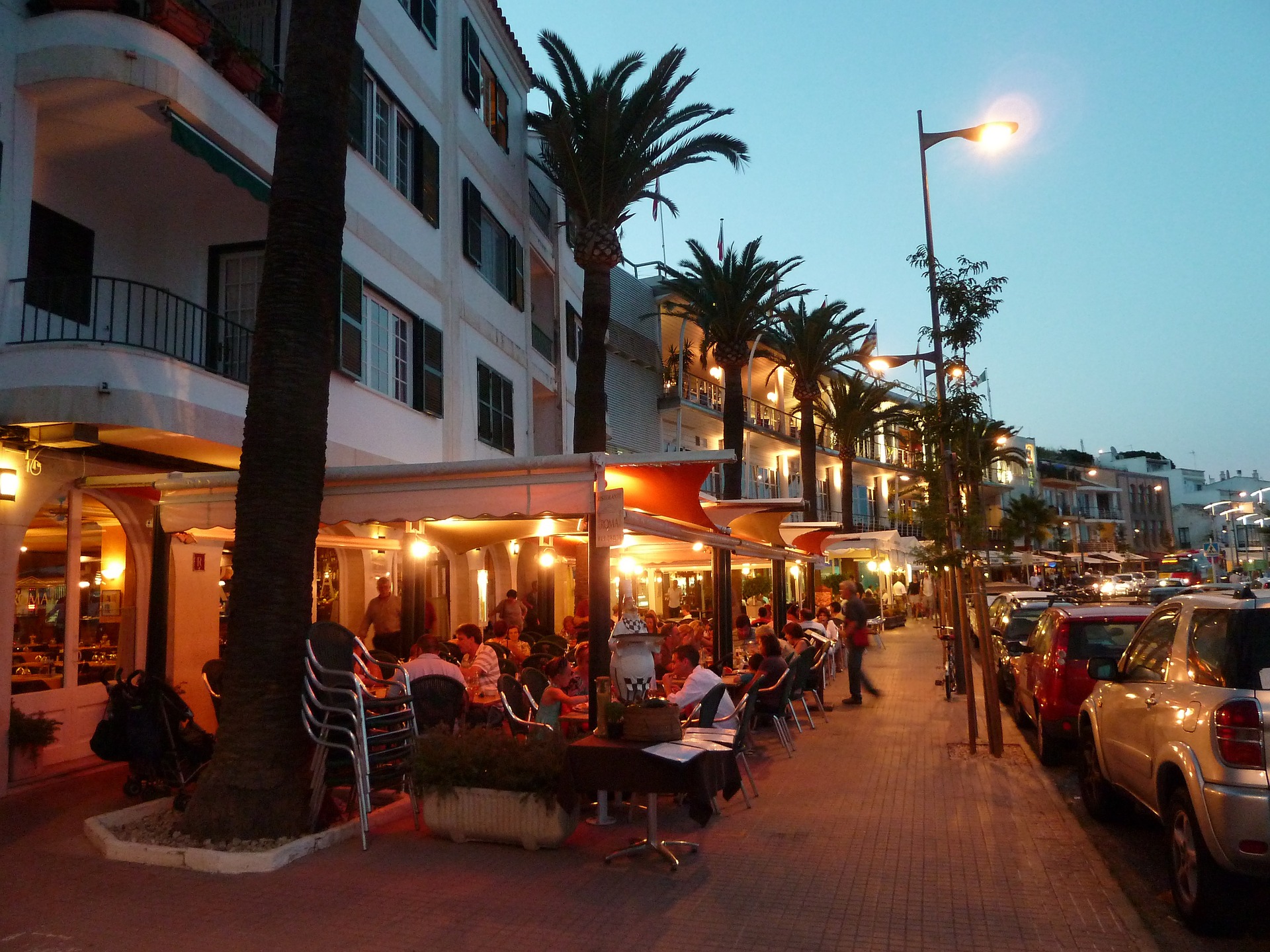 Cafe terraces open in Croatia from March 1st 2021, if Coronavirus numbers remain low, say media outlet Index
Cafe terraces open in Croatia from March 1st 2021, if Coronavirus numbers remain low, say media outlet Index
Croatian cafe terraces open, the interior of cafes and restaurants remain closed
“As we find out, the terraces of cafes and restaurants will definitely open on March 1,” wrote Index. “However, according to information from a source close to the Headquarters, the closed (interior) parts of cafes and restaurants will not be opened. (This) is realistically expected in April at the earliest.”
“Once cafe terraces open, guests will most likely not be able to enter the interiors of cafes and restaurants, except perhaps for the use of toilets, to prevent indoor parts of cafes and restaurants from being used and guests being served there. Closed spaces are still considered by headquarters (to be) an extremely high risk when it comes to the spread of coronavirus.”
Further relaxation of Coronavirus measures: Indoor sports to return
According to Index, although the first information received said that from March 1, only indoor sports for children would be opened, the portal has discovered that instead all indoor sports should be opened, with prescribed epidemiological measures. They remind that, according to current measures, only gyms, swimming pools and contactless individual ball sports are allowed.
Public gatherings / marketplaces / fairs
“There should be concessions when it comes to fairs, but it is not yet completely clear under what conditions,” says the portal. Like supermarkets, open-air and indoor markets are currently permitted to operate. The newly relaxed measures will pertain to similar, but more irregular events at which arts & crafts, books and other goods are on display for sale. The portal say that the vending and consumption of food – which is traditional at such events – will likely not be permitted for now.
“The headquarters is inclined to open fairs where products are sold or exhibited, but the consumption of food and drinks might be limited to prevent excessive gatherings and socializing,” they say.
Relaxation of Coronavirus measures pertaining to private gatherings
“The allowed number of people at various gatherings should not change significantly, only minor corrections are possible,” claims the portal, adding that the current ban on the gathering of people from more than two households may instead be downgraded to a recommendation. The portal reminds that this measure has not been strictly enforced in any way before.
"To give way on March 1, the numbers have to stay at about the level they are now. But the pressure is great - no one wants to keep something closed that should not be kept closed. Most of it is already open, so there remains a narrow circle of what can still be given,” a source close to the Headquarters is quoted as telling Index.
Friction between regional and national authorities over easing of Covid-19 measures
Even if cafe terrace open on March 1st, Index concludes their article by reminding that a disparity between regional and national authorities is still causing some friction. The friction between two north-westerly regions of the country and national headquarters is specifically addressed.
“The Headquarters believes that the announcement of the Istrian Headquarters that they will open the terraces of cafes and restaurants on March 1 was very incorrect. They (national headquarters) say that this opening is planned at the level of the whole of Croatia anyway.”
“However, the decision of the Primorje-Gorski Kotar headquarters, which postponed the opening of bookmakers and casinos in that county, is perhaps even more critically commented on. The government states that the opening of bookmakers (betting shops) and casinos is a purely financial decision and ironically comments that if the Primorje-Gorski Kotar County wants to leave these facilities closed, they should (themselves) cover the costs that will be incurred,” says the Index article.
Index claims that these moves from Istria and Rijeka (Primorje-Gorski Kotar) are regarded in the National Headquarters and the government as politicking and that they are connected with the upcoming local elections.
For the latest travel info, bookmark our main travel info article, which is updated daily.
Read the Croatian Travel Update in your language - now available in 24 languages
Epidemiologist: At This Rate, Vaccination Goal Won't Be Met Until Autumn
February 9, 2021 – In a Croatian media TV interview, epidemiologist of the Croatian Institute of Public Health Bernard Kaić yesterday said the plan to vaccinate half of the population by the summer will be delayed. He predicted that if Croatia continues vaccination at its current rate, the goal would not be reached until autumn, possibly late autumn
Epidemiologist of the Croatian Institute of Public Health Bernard Kaić, speaking to Croatian media RTL, told them the plan to vaccinate half of the population by the summer will be delayed. The epidemiologist predicted that if Croatia continues vaccination at its current rate, the goal of vaccinating half of the population within the country will not be completed until autumn, possibly late autumn.
"I can't say (by) exactly how much,” he told RTL, regarding how much delay will occur, “because we still don't know how many vaccines we'll get in March. And (how much) after March we (still) have no idea.”
“If this pace continues, it would take four million doses to vaccinate half the population. We won't achieve that until autumn for sure, and it’s late autumn,” the epidemiologist said.
According to an article in Index, the epidemiologist said that, as things currently stand, there will be three vaccines used in Croatia - AstraZeneca, Moderna and Pfizer / BioNTech. They will be used concurrently, with vaccinations from all three available in Croatia at the same time.
When asked which vaccine he would choose to be vaccinated with, the epidemiologist answered that he did not know and that he was glad that he did not have the opportunity to choose. "There was only one offered so I got vaccinated,” said the epidemiologist. “It would be really hard to decide."
When asked why some states have given up vaccinating those over the age of 65 with the AstraZeneca vaccine, the epidemiologist explained that in currently available results from clinical studies the messenger RNA vaccine had proven to be somewhat more effective in preventing mild forms of Coronavirus than the AstraZeneca vaccine. Some of the vaccines work in different ways. However, the epidemiologist ultimately said that it was expected the AstraZeneca vaccine would prove to be effective, it was just that this had not yet been proven statistically.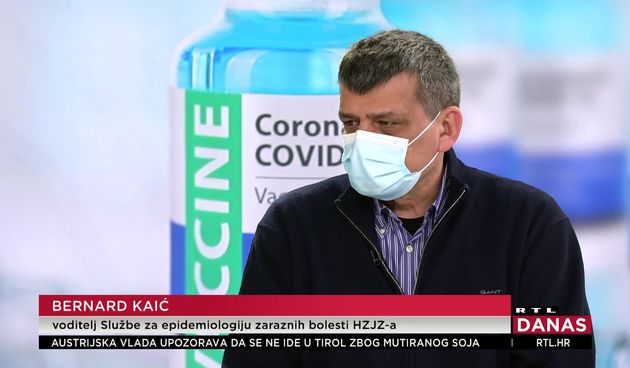 RTL screenshot
RTL screenshot
Later in the interview, the epidemiologist was asked “Due to skepticism towards AstraZeneca, many associations in (Croatia's) border areas plan to take pensioners to Serbia for vaccination. How smart is it to accept such an arrangement?”
The epidemiologist replied; “My only fear is that such organized trips do not turn into corona-trips so that people do not get infected on the way back and forth and do themselves harm. I would wait.”
The three vaccines for which Croatia is currently expecting deliveries are now not the only vaccines available. Speaking in a discussion on the same evening on another Croatian media outlet, HRT, Zlatko Trobonjača, an immunologist from the Rijeka Clinical Hospital, spoke about the Russian vaccine.
"Our country is obviously following the EU and its decisions,” he said. “The EU has entered into talks with Russia. It can be expected that these talks will continue. It is a quality vaccine, it provides high protection.”
"As for the quality of the vaccine, we can see that it is not harmful and it could be used in our country. The EU is oriented towards Western companies. And now, they (the companies) did not stick to the agreement," Trobonjača said, adding that he would be vaccinated with the first vaccine that was made available to him.
Jutarnji List: Croatian Cafes Open on Monday 15 February (and Gyms too)?
February 2, 2021 – The wait is over! In less than two weeks, Croatian cafes and gyms will open, if infection numbers continue on their current downward trajectory
With the spring season just around the corner, people will soon be able to once again enjoy coffee on the sun-filled daytime terraces of Croatian cafes. If Coronavirus infection numbers continue on their current downward trajectory, Croatian cafes and gyms will open on Monday 15 February. All businesses will still have to operate under strict epidemiological measures.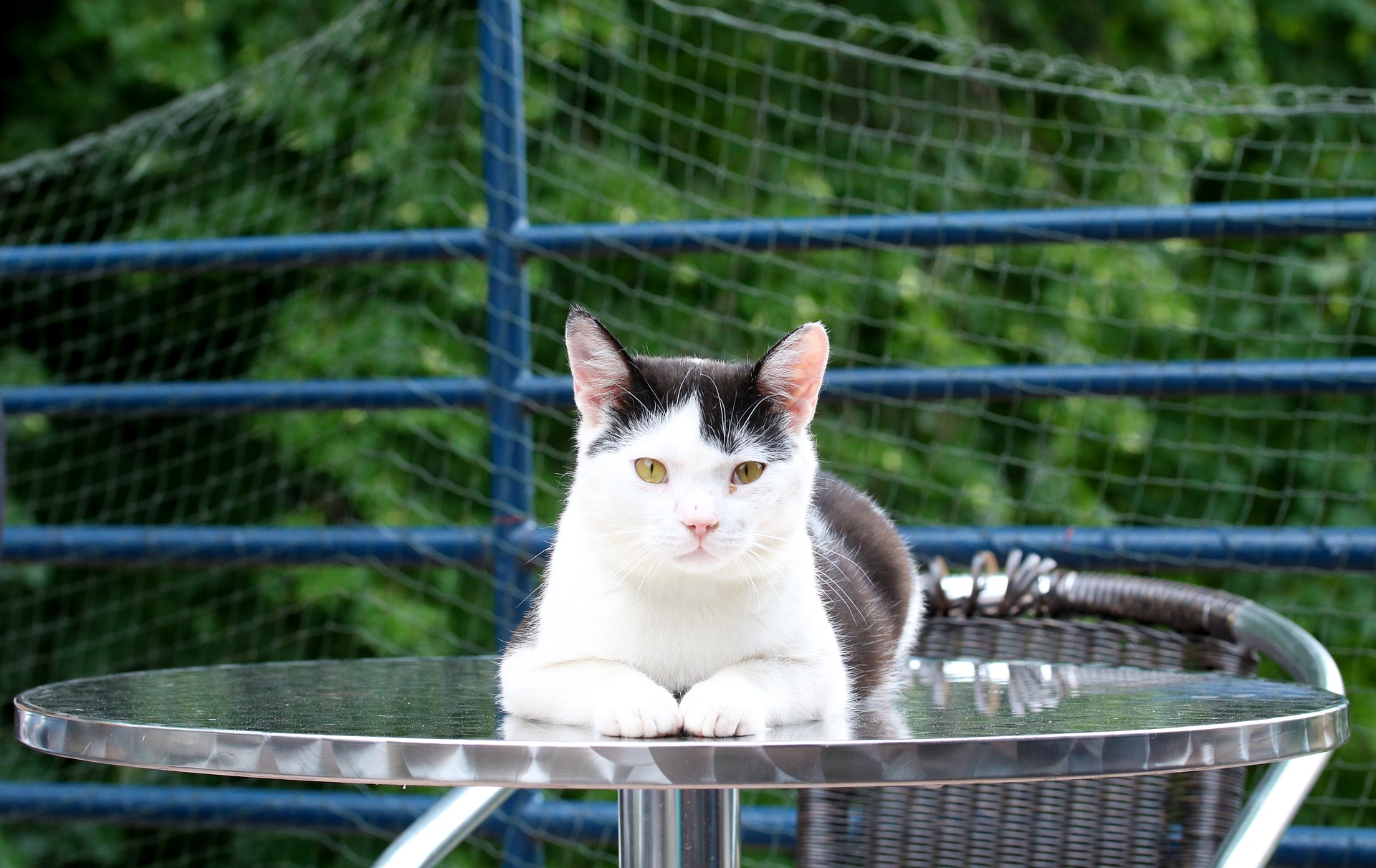
Deputy Prime Minister and the Chief of Staff, Davor Božinović, spoke about the forthcoming concessions on Croatian cafes and gyms, but a fuller picture of how the concessions will actually look was discovered unofficially by Croatian daily Jutarnji List. It was published in the evening of Monday 1st February 2021. The good news soon travelled across Croatia. It will come as a great relief to many independent business owners who have not been allowed to operate.
Business owners have been increasingly on edge over recent weeks, with protest openings of Croatian cafes and gyms threatened to take place in defiance of the current ban on operations (indeed, some did). Owners of Croatian cafes were particularly irked by the seeming inconsistencies in current measures – fast food outlets, gas service stations and bakeries were all permitted to sell coffee to go. People took advantage of this and thereafter congregated on the streets outside such businesses to enjoy their drinks. But, Croatian cafes were still not permitted to service people wishing to drink on outside terraces in almost exactly the same manner.
Monday 15 February has long been announced as the next review date for the imposed Coronavirus measures. But, until now, nobody was certain in which way – if any – measures would be relaxed.
Under unofficial plans, from Monday 15 February Croatian cafes will be able to serve coffee and drinks to be consumed on outside terraces, with strict epidemiological guidelines in place.
Croatian cafes and gyms opening on 15 February will be conditional on a continued downturn in infection numbers and the absence of new Coronavirus strains appearing in Croatia
The re-opening of Croatian cafes and gyms is wholly dependent not only on the continuing downturn in numbers of infected but also on the condition that new strains of Coronavirus - specifically those first detected in the UK and South Africa - do not appear in Croatia between now and then.
"If the indicators are good, if the numbers go down, we will certainly not be reluctant to react,” Deputy Prime Minister Davor Božinović said, regarding the 15 February review, “our aim to strike a balance between everything - with an emphasis on health care - has brought us to a position where Croatia has the least stringent measures in the EU."
Coronavirus infection numbers in some other European territories remain at an alarmingly high rate, although a corresponding relaxation in measures for some regions of Italy was similarly announced over recent days. This is the second time since the start of the pandemic that stricter measures imposed by the Croatian government – and a widespread public observance of these measures and other guidelines - have successfully produced the intended results.
Miroslav Tudman, son of Franjo Tudman, has died from Coronavirus
February 1, 2021 – Miroslav Tudman, the first child of Franjo Tudman, died in Zagreb from complications caused by Coronavirus. A scientist and educator who followed a route into politics, he bore a striking resemblance to his father, the first President of Croatia
Miroslav Tudjman, HDZ member of parliament and son of Franjo Tudman, the first President of Croatia, died in the evening of Sunday 31 January 2021 in Zagreb. He was 75 years old.
Miroslav Tudjman had been hospitalized in Zagreb at the beginning of December due to complications caused by Coronavirus. He had been placed on a respirator. He sadly lost his fight for life at the Dr. Fran Mihaljevic Clinic for Infectious Diseases, Zagreb.
Born in Belgrade in 1946, the son of Franjo Tudman and his first wife Ankica Zumbar, Miroslav Tudman moved to Zagreb in 1961. He graduated from the Faculty of Philosophy at the University of Zagreb in 1970 and later became part of the faculty, founding its Institute for Information Studies in 1989.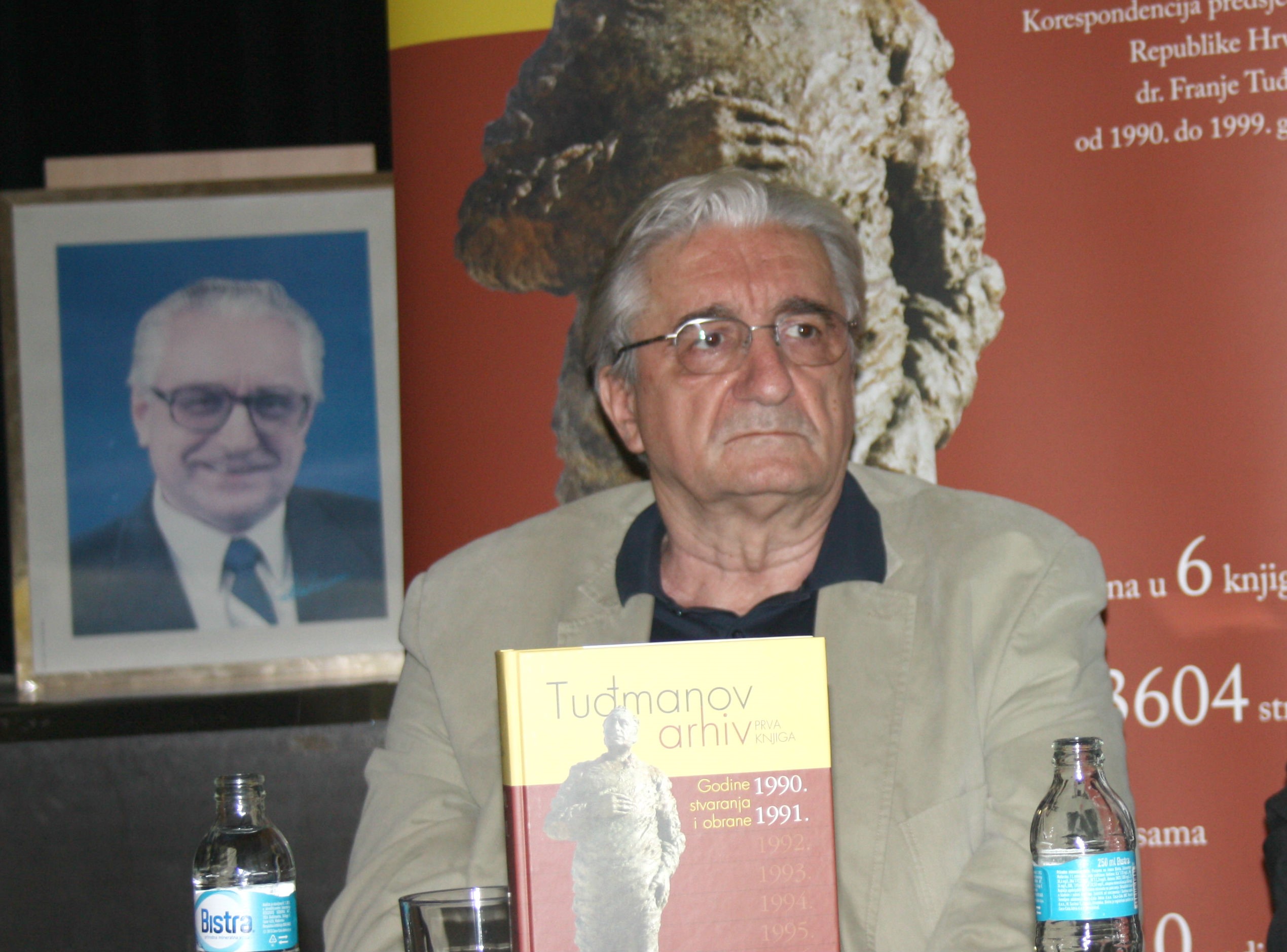 Miroslav Tudman © HDZ
Miroslav Tudman © HDZ
He took part in the Croatian War of Independence and in 1992 Miroslav Tudman became the head of the Centre for Strategic Research. He took up the role as the deputy head of the National Security Office before founding and leading the first Croatian Intelligence Agency (Hrvatska izvještajna služba, HIS). In 1998, Miroslav Tudman became a tenured professor at the Faculty of Philosophy where he had studied.
Miroslav Tudman had dallied with politics since before the war, but it was only after the passing of his father – who died while in office – that they became a more consuming affair for him. He flitted between running as an independent candidate, within fringe parties and as a member of HDZ, the party to which his father belonged. His longest duration with any party was from 2011 and 2021, during which he was a member of HDZ.
At the time of his death, he was a member of the Croatian parliament, head of the Parliamentary Delegation to the NATO Parliamentary Assembly, a member of the Committee on Defence, Internal Policy and National Security, War Veterans and Inter-Parliamentary Cooperation.
Bearing a very close resemblance to his father, Miroslav Tudman was named after Croatian writer Miroslav Krleža who his father adored at the time of his firstborn child.
Prime Minister Andrej Plenković said that he received the news of Miroslav Tudman's death with sadness.
"It is with great sadness that I received the news of the departure of Prof. Miroslav Tudman, PhD, a dear colleague, friend and member of the Croatian Parliament, son of the first Croatian President Franjo Tudman, a prominent politician and a scientist dedicated to protecting national interests," he wrote on Twitter. "In these sad and painful moments, for the Tudman family, I express my sincere condolences and sympathy, on behalf of the government and myself."
For the latest travel info, bookmark our main travel info article, which is updated daily.
Read the Croatian Travel Update in your language - now available in 24 languages
Zagreb Cafes Protest Opening 1st Feb Cancelled, Fines Too Severe
January 31, 2021 – The planned cafes protest in Zagreb and elsewhere, which was due to see 100 facilities open their doors on Monday 1st February in defiance of the current ban on their operations, has been cancelled. Huge fines and the threat of prison are the reason for the climb down. Minister of Economy and Sustainable Development Tomislav Coric appealed to caterers for patience.
The proposed Zagreb cafes protest organised for Monday 1st February has been cancelled. The protest was due to see some catering facilities and gyms open their doors to the public in defiance of the current nationwide ban on operations in such facilities. Around 100 businesses were said to be joining the Zagreb cafes protest.
"Although it has been rumoured that more than 100 caterers in Zagreb will open their facilities on February 1, mostly cafes, or at least start issuing coffee and drinks outside, despite the work ban, it does not seem this will (now) happen, as many have withdrawn after seeing all the consequences that could befall them if they do, " Franz Letica, president of the Zagreb Caterers' Association, told Hina by telephone after the meeting.
On Friday 29 January, the Association of Caterers in Zagreb announced the opening of at least 100 bars and Croatian cafes would open on Monday. An informal meeting of caterers, many who were due to take part in the cafes protest, took place on the afternoon of Saturday 30 January. It seems that at the meeting, plans for the cafes protest fell apart. Caterers had faced the possible punishment of fines - from 20 thousand kuna to 70 thousand kuna - and up to three years in prison for defying the law and opening during the cafes protest.
Petra Odobašić, the owner of a catering facility from Zagreb who attended Saturday's informal meeting, also confirmed to Hina there would be no mass opening on Monday, but that only a dozen caterers would continue with the cafes protest. This handful of establishments were described as being situated mostly in the Dubrava area of Zagreb. Around 80 caterers attended Saturday's informal meeting, mostly from Zagreb, but some from other areas such as Karlovac.
Appearing on Croatian television on Saturday 30 January, Minister of Economy and Sustainable Development Tomislav Coric appealed to caterers for patience.
"We hope there will be (patience)," he said when asked about the proposed act of defiance, "given that we have explained the epidemiological situation we are currently in. We need to think about the season - spring and summer - this will be the time when we can all reap the fruits of responsibility together."
What Kind of Life Awaits Croatian Anti-Vaxxers Who Refuse Vaccination?
December 29, 2020 – The arrival of COVID-19 vaccines in Croatia has been met with much relief by many people. But, not everyone is happy. Conspiracy theorists - those who favour disreputable sources and 'whispers on the wind' to real science - are reticent, some even angry. So, what kind of life awaits Croatian anti-vaxxers who refuse to take the vaccine?
The people who inhabit the lands now known as Croatia have a long history of being pushed around. For this, they cannot be blamed. Greatly outnumbered by the occupying armies of some of the most powerful empires of all time - the Romans, Venetians, Austro-Hungarians and Ottomans - their rebellions against such overlords have been relatively small in number. Their default setting has been to visit the kafana at the end of the day and moan, grumble, gossip - perhaps even plot - against those who make their lives disagreeable.
Croatia was finally freed of its last imposing masters over two decades ago. But, true to form, the grumbling in the kafanas has continued. Except, now that the kafanas are all closed in response to Coronavirus, the moaning has moved almost exclusively to the internet. And, it has reached a shrieking pitch.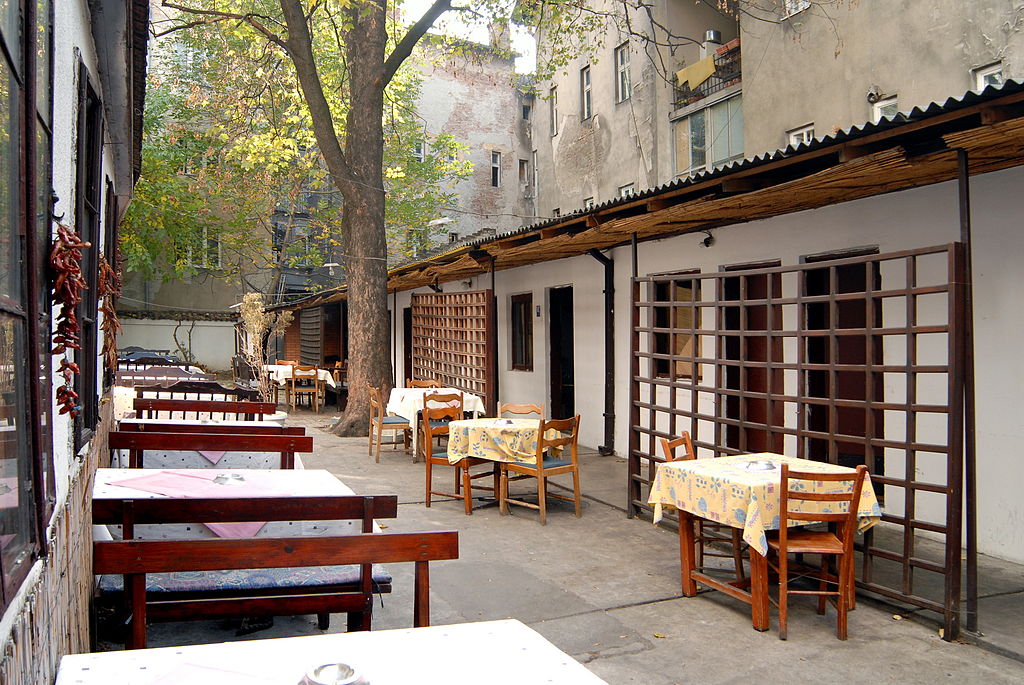
The arrival of COVID-19 vaccines in Croatia has been met with much relief by many Croatians. The news of the first vaccinated citizen, followed by the first vaccinated healthcare workers, was also well received. You can tell this from the overwhelmingly large amount of 'likes' such news generates when posted to social media. These warm welcomers of good news in Croatia could be best described as the silent majority. And, in the same way most Croatians lay subdued for lifetimes under bullying empires, this silent, sensible majority is drowned out by the deafening vitriol of the unhinged within the comments sections underneath.
These arch-moaners appear in the comments on most issues, railing against the increasingly modern ways of the world. On the issue of Coronavirus and the incoming vaccines, it is the Croatian anti-vaxxers who are angrily dominating the discourse.
It appears near pointless to debate with them. They are not ones for science, facts nor reasonable debate. Not for them are the reports of scientific journals, the BBC, The New York Times, The Guardian, Al Jazeera, or The Washington Post. Instead, they cite the most spurious of sources – a website nobody else has heard of, a document written by a friendless doctor from the Texas farming community who has a curiously photoshopped profile picture, a Youtube video made for the same price as a hamburger and narrated by a 17-year-old from the outside toilet. There's no point telling them that the vaccines coming onto the market were actually designed back on January 13, just two days after the Coronavirus genetic sequence had been made public and that it has taken until now to produce them, due to stringent testing on their safety. No. Because for Croatian anti-vaxxers, whispers on the wind, the horoscopes, crystal ball of the fortune-teller and the inescapable stare of Braco are just as reliable - if they're telling you what you want to believe. For whichever lunatic theory you want to adopt, you can look online and you'll be sure to find some crackpot to back it up. The internet is the great leveller for Croatian anti-vaxxers as well as everywhere else - a place where deposed Nigerian royalty who want to put money in your bank account have just as much credence as an 80-year-old media title with a blemishless reputation.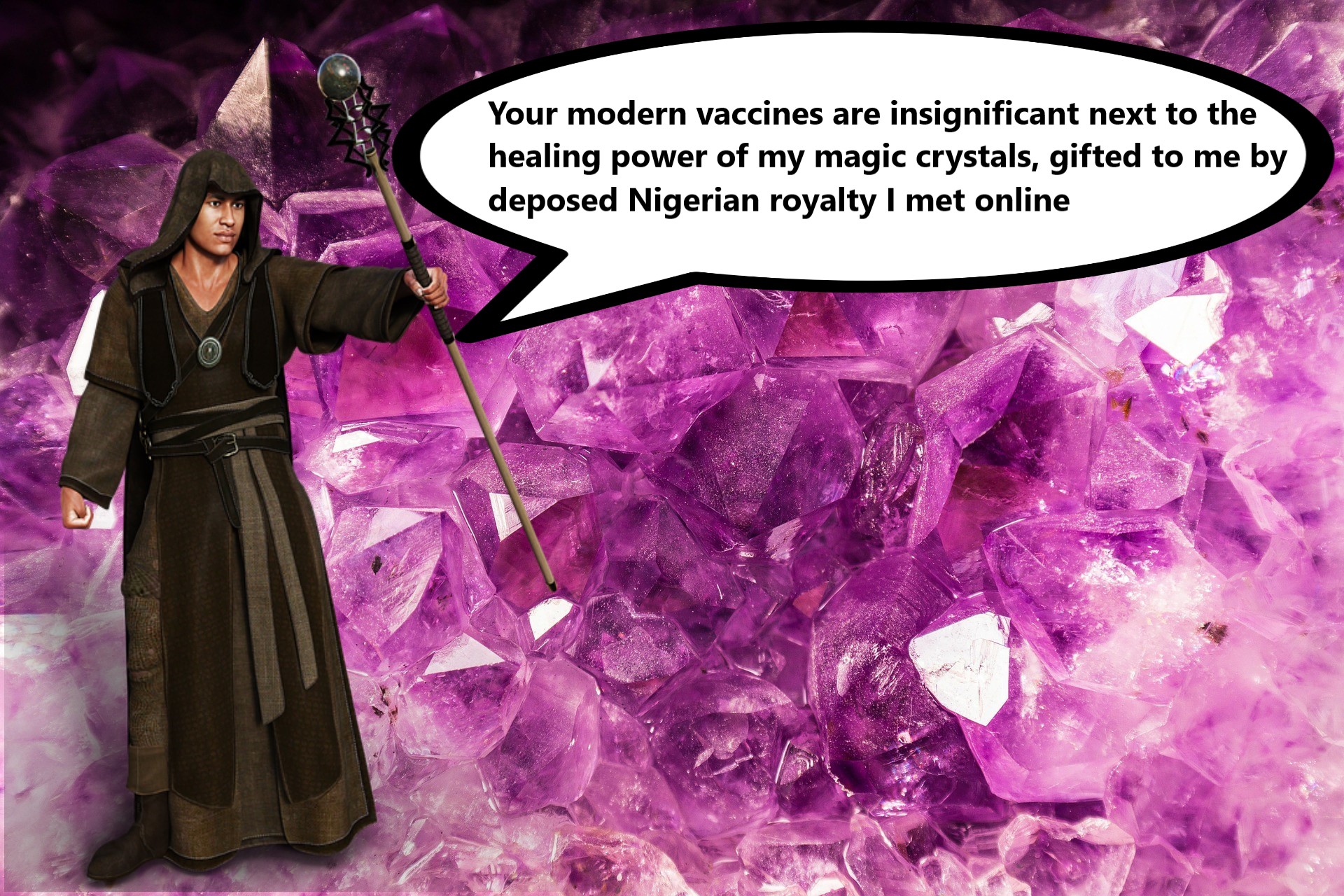
Of course, while life is too short to even debate with anti-vaxxers in Croatia or anywhere else, that's not to say they are undeserving of sympathy. In our recent interview with a doctor working on the Coronavirus frontline in a Croatian hospital, they generously raised an interesting defence of the tin-foil hat brigade - “It's not always the content of the conspiracy theory that appeals to these people as much as it is their inability to accept facts – the truth – because they have little faith in the authorities that are telling them.”
Finding fault in authorities is far from unique to Croatia. Yes, there is a certain amount of kafana moaning and grumbling all over the world, and often for good reason. Politicians are more than aware of this. And, in an era of widespread voter apathy and low voter turnout, where yet another silent majority has the potential so easily to change the names of those who govern, this is exactly why politicians will abstain from making the Coronavirus vaccines mandatory. With things as they currently stand, it is near inconceivable that Coronavirus vaccines will be made compulsory in Croatia or in any other western democracy. Good news for Croatian anti-vaxxers? Well, not quite, because it is highly likely that the private sector will be among the greatest of persuaders for vaccination. It is not unthinkable that we are about to enter a wholly new two-tiered society – the vaccinated and the unvaccinated. And signs of what that life might look like for Croatian anti-vaxxers are not good. They are not good at all.
“Vaccination could become one of the measures that would make it possible to come to events,” Stefan Breitenmoser, general manager of the Professional Association of Swiss Organizers of Concerts, Events and Festivals, told Sonntags Blick in the past week. In Switzerland, vaccination began on Wednesday and it is free. It is not only the entertainment events industry that is considering the measure - the Swiss Football League similarly said it is giving it serious consideration. Professional sports and the events industry have lost billions during the pandemic. The 2021 Olympics hangs on a knife-edge in regards to accepting audiences into its stadiums – it has already been delayed by a year. It is highly conceivable that access to all large events in future will be dependent on proof of vaccination. The National Stadium in Japan was due to host some of the key events of the 2020 Summer Olympics. The whole event has been delayed until summer 2021, in response to the pandemic © Arne Müseler
The National Stadium in Japan was due to host some of the key events of the 2020 Summer Olympics. The whole event has been delayed until summer 2021, in response to the pandemic © Arne Müseler
In an interview on N1 television in Croatia over recent days, epidemiologist Branko Kolarić - a member of the Scientific Council of the Government of the Republic of Croatia - echoed similar thinking. He stated that a list of the vaccinated will be carefully maintained, most likely through some kind of e-documents, and although vaccination will not be mandatory, vaccination will bring some benefits - such as air travel, group gatherings and attendance of concerts and festivals. You are surely not going to see police or soldiers checking your vaccination status at the entry to a dance music festival in Dalmatia. But, it is highly likely that event organisers will insist on proof of vaccination before granting entry. Even if they don't wish to, it is more than conceivable that they would not be granted the necessary licenses nor insurance without assuming such a position.
Another industry that has lost billions in the pandemic is the travel and tourism sector. Little surprise then to have found budget airline Ryanair launching a new campaign of 'Jab and go' over the last few days. The suggestion is crystal clear – get vaccinated, you can come on our planes, we'll allow you to travel. Ryanair will certainly not be the last airline to assume responsibility for vetting passengers' vaccination status. Croatian anti-vaxxers had better be really happy to be here, because international borders may well be permanently closed for them while they remain unvaccinated.
So, a life with no spectating at big sports events, no more large concerts or music festivals and no more international travel is what seems to be just around the corner for Croatian anti-vaxxers. Sounds harsh, unpleasant. But what if it extends to libraries, schools or even hospitals? We don't yet know anything concrete about the lower tier of existence Croatian anti-vaxxers may choose to dwell in. But, it's not where I want to live. Perhaps they'll even be forced to drink exclusively in their own anti-vaxxer kafanas? For sure they'll be easy to identify – they'll be the ones from which the loudest moans are coming.
The views expressed in this article are solely those of the author and are not necessarily shared by Total Croatia News


